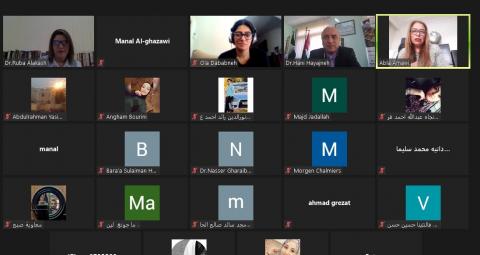

At the invitation of the Anthropology Department- College of Archeology and Anthropology at Yarmouk University, HPC Secretary General, Dr. Abla Amawi, gave a lecture on Monday on “Domestic Violence during Covid-19” to the university’s faculty and students through Zoom application.
During the lecture, Amawi stated that the Covid-19 pandemic has had substantial health, economic and social consequences on different population groups, particularly women, undermining their active and key role in advancing societies.
Amawi added that domestic violence rates increase during emergencies, including epidemics, and that the situation becomes even more complicated for refugee and migrant women due to the forced coexistence and full isolation with a violent person as well as the limited availability and access to violence protection services as a result of movement restrictions.
Amawi noted that women with disabilities, especially women refugee, are the most vulnerable to physical, emotional, sexual or financial violence and that they are more susceptible to neglect, detention and deterioration as they are unable to escape or defend themselves and lack access to justice. Amawi said that in these circumstances, women face difficulties in accessing sexual and reproductive health services due to reasons including the negative attitudes of care providers and the cost of care.
Furthermore, Amawi explained that pressures on women increase during emergency situations, such as the Covid-19 pandemic, especially as women provide care to children, older persons, sick persons or persons with disabilities. Amawi noted that in the Arab region, the amount of unpaid care work shouldered by women is five times higher than that shouldered by men amid the closure of schools and care homes, thus adding to the burden and the responsibilities of women.
Health-wise, Amawi noted that the situation of females in Jordan puts them at risk during the Covid-19 outbreak, as nursing is a predominantly female occupation, putting females in direct contact with patients and increasing their risk of infection. It is worth noting that the chronic disease prevalence rate among females is higher than it is among males, standing at 13.9% for females and 11.8% for males.
In addition, Amawi said that on the economic side, women in Jordan are more susceptible to financial losses during the pandemic, especially that 56.8% of individual home-based businesses are owned by women and are expected to be directly impacted by the pandemic, making women the first to be affected. Moreover, 25.6% of working women take up limited-income elementary occupations that area difficult to perform remotely, which jeopardizes the continuity of work and leads to losing the source of income.
Amawi indicated that states can overcome the pandemic at three levels, namely through a strong state that has good governance and strong institutions within and outside the government, a strong political system, and a cohesive society.
The session was attended by the Dean of Archeology and Anthropology, Dr. Hani Al Hayajneh and the head of the Anthropology Department, Dr. Ruba Al Akash, and included a questions and answers session with the attendees.







